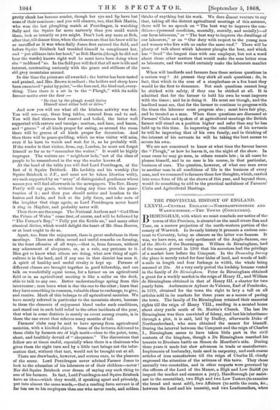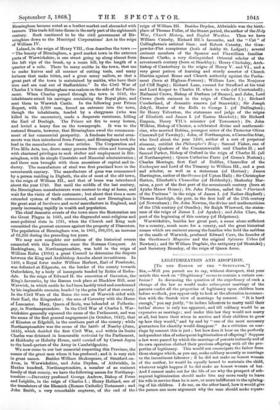TIIE PROVINCIAL HISTORY OF ENGLA.ND.
LXXVIL—CENTRAL ENGLAND :—NORTHAMPTONSHIRE AND WARWICKSHIRE.—THE TOW.NS (CONCLUDED).
BIR M IN GH AM, with which we must conclude our notice of the towns of this Province, is situated on the small rivers Rea and Tone, on a narrow projection of the north-western portion of the county of Warwick. In its early history it presents a curious con- trast to Coventry, being as obscure as the latter was famous. It was, we have seen, an early settlement of the Anglo-Saxons, one of the Marks of the Beormingas. William de Birmingham, lord of the manor, proved in 1309 that his ancestors had the privilege of a market here before the Conquest. In the Domesday Survey the place is merely rated for four hides of land, and woods of half- a-mile in length and four furlongs in width, the whole being assessed at 20s. At a very early period the lordship became vested in the family of De Birmingham. Peter de Birmingham obtained a grant for a weekly market in the reign of Henry II., and William de Birmingham obtained in that of Henry III. a charter for two yearly fairs. Audomore or Aylmer de Valence, Earl of Pembroke, in 1319, obtained for the town the right to levy a toll on all articles sold in its markets for three years as a means of paving the town. The family of De Birmingham retained their manorial rights till the reign of Henry VIII., residing in a moated house about sixty yards south of St. Martin's Church. The last De Birmingham was then convicted of felony, and lost his inheritance through a plot, it is said, laid by Dudley, afterwards Duke of Northumberland, who soon obtained the manor for himself. During the interval between the Conquest and the reign of Charles I., Birmingham seems to have taken little part in the civil contests of the kingdom, though a De Birmingham marched his tenants to Evesham battle on Simon de Montfort's aide. During these years it made but slow advances in trade or manufacture. Implements of husbandry, tools used in carpentry, and such coarse articles of iron manufacture till the reign of Charles II. chiefly engrossed the attention of the artisans of this town. They chose annually two constables, and in other respects were governed by the officers of the Lord of the Manor, a High and Low Bailiff (to inspect the market and summon a jury), Handborough (or assist- ant to the constables), two High and two Low Tasters (to examine the bread and meat sold), two .Affeirers (to settle the rents, Sze., between the Lord and his tenants), and two Leathersellers, when
Birmingham became noted as a leather market and abounded with tanners. This trade fell into disuse in the early part of the eighteenth century. Such continued to be the civil government of Bir- mingham down to the Municipal Corporations' Act in the reign of William IV.
Leland, in the reign of Henry VIII., thus describes the town :— " The beauty of Birmingham, a good market town in the extreme parts of Warwickshire, is one street going up along almost from the left ripe of the brook, up a mean hill, by the length of a quarter of a mile. There be many smiths in the town, that use to make knives and all manner of cutting tools, and many loriners that make bitte,s, and a great many nailers, so that a great part of the town is maintained by smiths, who have their iron and sea coal out of Staffordshire." In the Civil War of Charles I.'s time Birmingham was zealous on the side of the Parlia- ment. When Charles passed through the town in 1642, the inhabitants seized his carriages containing the Royal plate, and sent them to Warwick Castle. In the following year Prince Rupert, with 2,000 men, forced an entrance into the town, though the inhabitants, headed by a clergyman (who was killed in the encounter), made a desperate resistance, killing the Earl of Denbigh. The Prince set fire to many houses, and levied a heavy fine on the townspeople. It was to the restored Stuarts, however, that Birmingham owed the commence- ment of her commercial prosperity. A fondness for metal orna- ments was then introduced from France, and Birmingham took the lead in the manufacture of these articles. The Corporation and Five Mile Acts, too, drove many persons from cities and boroughs with chartered privileges to seek shelter and employment in Bir- mingham, with its simple Constable and Manorial administration ; and these men brought with them accessions of capital and in- dustry. The manufacture of steel was first practised here in the seventeenth century. The manufacture of guns was commenced by a person residing in Digbeth, the site of most of the old town, in the reign of William III., and that of brass was introduced about the year 1740. But until the middle of the last century, the Birmingham manufacturers were content to stay at home, and wait for the visits of their customers ; but about that time a more extended system of traffic commenced, and now Birmingham is the great seat of hardware and metal manufacture in England, and yearly increasing rapidly in wealth and population.
The chief domestic events of the town since the Restoration are the Great Plague in 1665, and the disgraceful semi-religious and semi-political riots in 1791, when the Church and King mob committed the greatest excesses against the property of Dissenters. The population of Birmingham was, in 1861, 296,076, an increase of 63,235 during the preceding ten years.
We may now complete our notices of the historical events connected with this Province since the Norman Conquest. At Rockingham, in Northamptonshire, was held in the reign of William Rufus (1094) a great Council to determine the dispute between the King and Archbishop Anselin about investitures. In 1469, a Royal force under William Herbert, Earl of Pembroke, was defeated at Edgecote, on the border of the county towards Oxfordshire, by a body of insurgents headed by Robin of Bodes- dale. In the reign of Edward II. the execution of Gaveston, the King's favourite, by the Barons took place at Blacklow Hill, near Warwick, in which castle he had been hastily tried and condemned by his implacable enemies, headed by the grim Earl of that county. In the Civil Wars of the Roses the men of Warwick sided with their Earl, the Kingmaker ; the men of Coventry with the House of Lancaster. Mary, Queen of Scots, was beheaded at Fotherin- gay, in Northamptonshire. In the Civil War of Charles L War- wickshire generally espoused the cause of the Parliament, and was the scene of the first general engagement (in October, 1642), that of Kineton or Edgehill, in the southern part of the county ; while Northamptonshire was the scene of the battle of Naseby (June, 1645), which decided the first Civil War, and within its limits Charles was detained in honourable restraint by the Parliament, at Holdenby or liolmby House, until carried off by Cornet Joyce to the head-qarters of the Army in Cambridgeshire.
We now come to our last memorial respecting this Province, the names of the great men whom it has produced ; and it is very rich in great names. Besides William Shakespeare, of Stratford-on- Avon, in Warwickshire, and John Dryden, of Aldwinlde, in Httaloe hundred, Northamptonshire, a member of an eminent family of that county, we have the following names for Northamp- tonshire :—Daventry produced George Andrew, Bishop of Ferns and Leighlin, in the reign of Charles I.; Henry Holland, one of the translators of the Rhemish (Roman Catholic) Testament ; and John Smith, a very remarkable engraver, of the end of the
reign of William III. Besides Dryden, Aldwinkle was the birth- place of Thomas Fuller, of the Stuart period, the author of the Holy War, Church History, and English Worthies. Then we have William Catesby, Richard Ill.'s favourite, and the " Cat " of Collingbotme's satirical lines ; and Robert Catesby, the Gun- powder-Plot conspirator (both of Ashby St. Ledger) ; several eminent members of the Spencer and Fitzwilliam families Samuel Clarke, a very distinguished Oriental scholar of the seventeenth century (born at Brackley) ; Henry Chicheley, Arch- bishop of Canterbury in the reigns of Henry V. and VI., and a very great patron of learning and sturdy assertor of Church liberties against Rome and Church authority against the Parlia- ment (born at Higham-Ferrers) ; William Law, the Nonjuror (of Cliff Regis) ; Richard Lane, counsel for Strafford at his trial and Lord Keeper to Charles IL when in exile (of Courtenhall) ; Nathaniel Crewe, Bishop of Durham (of Steane), and John, Lord Crewe (both eminent in the reign of Charles 1.) ; Richard Cumberland, of dramatic renown (of Stanwick); Sir Joseph Jekyll, Master of the Rolls to George I. (of Dallington) ; Sir Henry Yelverton, the statesman and judge of the reigns of Elizabeth and James I. (of Easton Mauduit) ; Sir Richard Empson, Henry VII.'s minister (of Towcester) ; Dr. John Wilkins, Bishop of Chester, a celebrated divine and mathemati- cian, who married Robina, youngest sister of the Protector Oliver Cromwell (of Fawsley) ; John, of Northampton, a Carmelite friar, who lived about the year 1340, author of a sort of perpetual almanac, entitled the Philosopher's Ring ; Samuel Fisher, one of the early Quakers of the Commonwealth and Charles II.; and Samuel Parker, Bishop of Oxford in the reign of Charles II. (all of Northampton) ; Queen Catherine Parre (of Green's Norton) ; Charles Montagu, first Earl of Halifax, Chancellor of the Exchequer and Lord of the Treasury to William ILL, and a poet and scholar, as well as a statesman (of Horton) ; James Harrington, author of the Oceana (of Upton Hall) ; Sir Christopher Hatton, Elizabeth's Chancellor (of Holdenby) ; Shakerley Mar- mion, a poet of the first part of the seventeenth century (born at Aynho Manor house); Dr. John Preston, called the "Patriarch of the Puritans" in the reign of James I. (of Nether-Heyford) ; Thomas Randolph, the poet, in the first half of the 17th century (of Newenham) ; Dr. John Newton, the divine and mathematician of the 17th century (of Oundle) ; Sir Ralph Winwood, the states- man of the reign of James I. (of Aynho) ; and John Clare, the poet of the beginning of this century (of Helpatone).
Warwickshire, besides her great poet, a name alone sufficient for a country, much more for a county, and the great historical names which are eminent among the families who held the earldom or the castle of Warwick, produced Edward Cave, the founder of the Gentleman's Magazine and the original Sylvanus Urban (of Newton) ; and Sir William Dugdale, the antiquary (of Shustoke) ; and Secretary Bromley, of the reign of Queen Anne.































 Previous page
Previous page